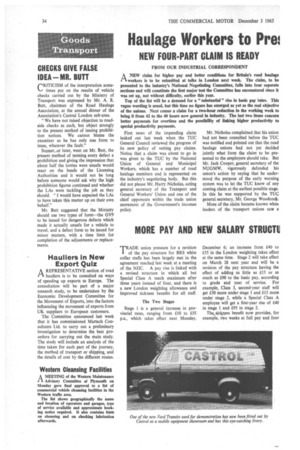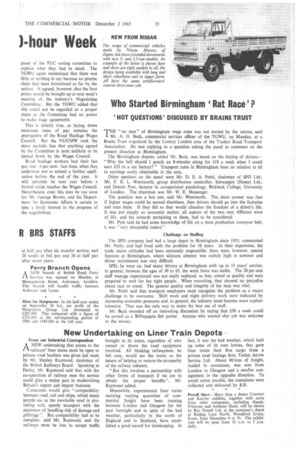Haulage Workers to Prel
Page 36

Page 37

If you've noticed an error in this article please click here to report it so we can fix it.
NEW FOUR-PART CLAIM IS READY
FROM OUR INDUSTRIAL CORRESPONDENT rA A NEW claim for higher pay and better conditions for Britain's road haulage workers is to be submitted at talks in London next week. The claim, to be presented to the industry's National Negotiating Committee, falls into four separate sections and will constitute the first major test the Committee has encountered since it was set up, not without difficulty, earlier this year.
Top of the list will be a demand for a " substantial " rise in basic pa,y rates. This vague wording is usual, but this time no figure has emerged as yet as the real objective of the unions. Next comes a claim for a two-hour reduction in the woiting week to bring it from 42 to the 40 hours now general in industry. The last two items concern better payments for overtime and the possibility of linking higher productivity to special productivity payments.
First news of the impending claim leaked out last week when the TUC General Council reviewed the progress of its new policy of vetting pay claims. Notice that a claim was about to go in was given to the TUC by the National Union of General and Municipal Workers, which has a number of road haulage members and is represented on the industry's negotiating body. But this did not please Mr. Harry Nicholas, acting general secretary of the Transport and General Workers' Union and one of the chief opponents within the trade union movement of the Government's incomes policy.
Mr. Nicholas complained that his union had not been consulted before the TUC was notified and pointed out that the road haulage unions had not yet decided jointly what form the claim to be presented to the employers should take. But Mr. Jack Cooper, general secretary of the NUGMW, vigorously defended his union's action by saying that he understood the purpose of the early warning system was to let the TUC know of any coming claim at the earliest possible stage. In this he was supported by the TUC general secretary, Mr. George Woodcock.
More of the claim became known when leaders of the transport unions saw a panel of the TUC vetting committee to explain what they had in mind. The TGWU again maintained that there was little or nothing to say because no precise claim had been formulated so far by the unions. it agreed, however, that the four points would be brought up at next week's meeting of the industry's Negotiating Committee. But the TGWU added that this could not be regarded as a proper claim as the Committee had no power to make wage agreements..
This is strictly true, as laying down minimum rates of pay remains the prerogative of the Road Haulage Wages Council. But the 'NUGMW took the more realistic line that anything agreed by the Committee is most unlikely to be turned down by the Wages Council. Road haulage workers had their last pay rise-6 per cent—last June, when they undertook not to submit a further application before the end of the year. It will certainly be next year before a formal claim reaches the Wages Council. Neverthelesk, even this may be too soon for Mr. George Brown, and his Department for Economic Affairs is certain to take a lively interest in the progress of the negotiations.
















































































































































































